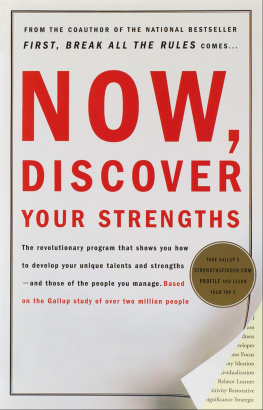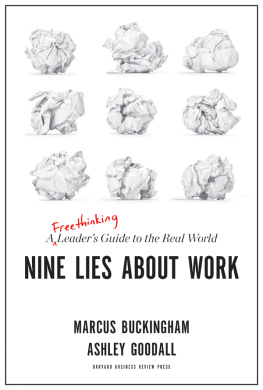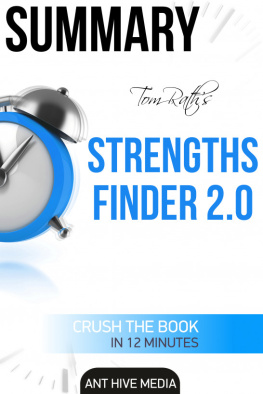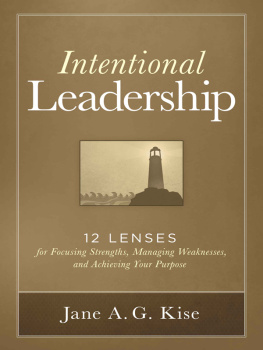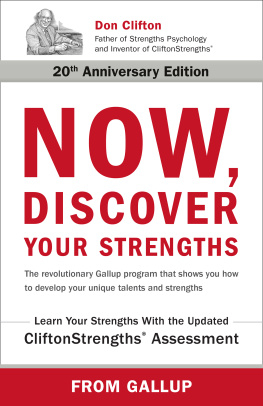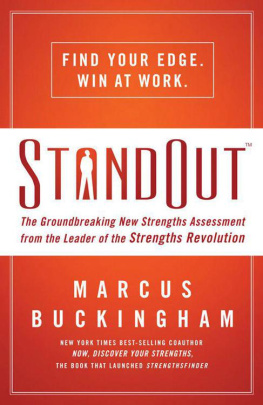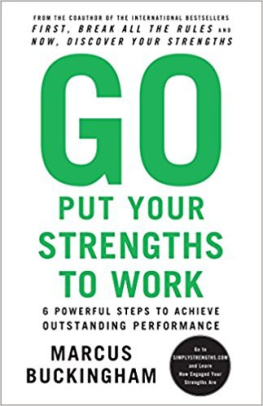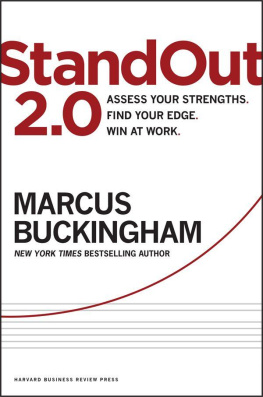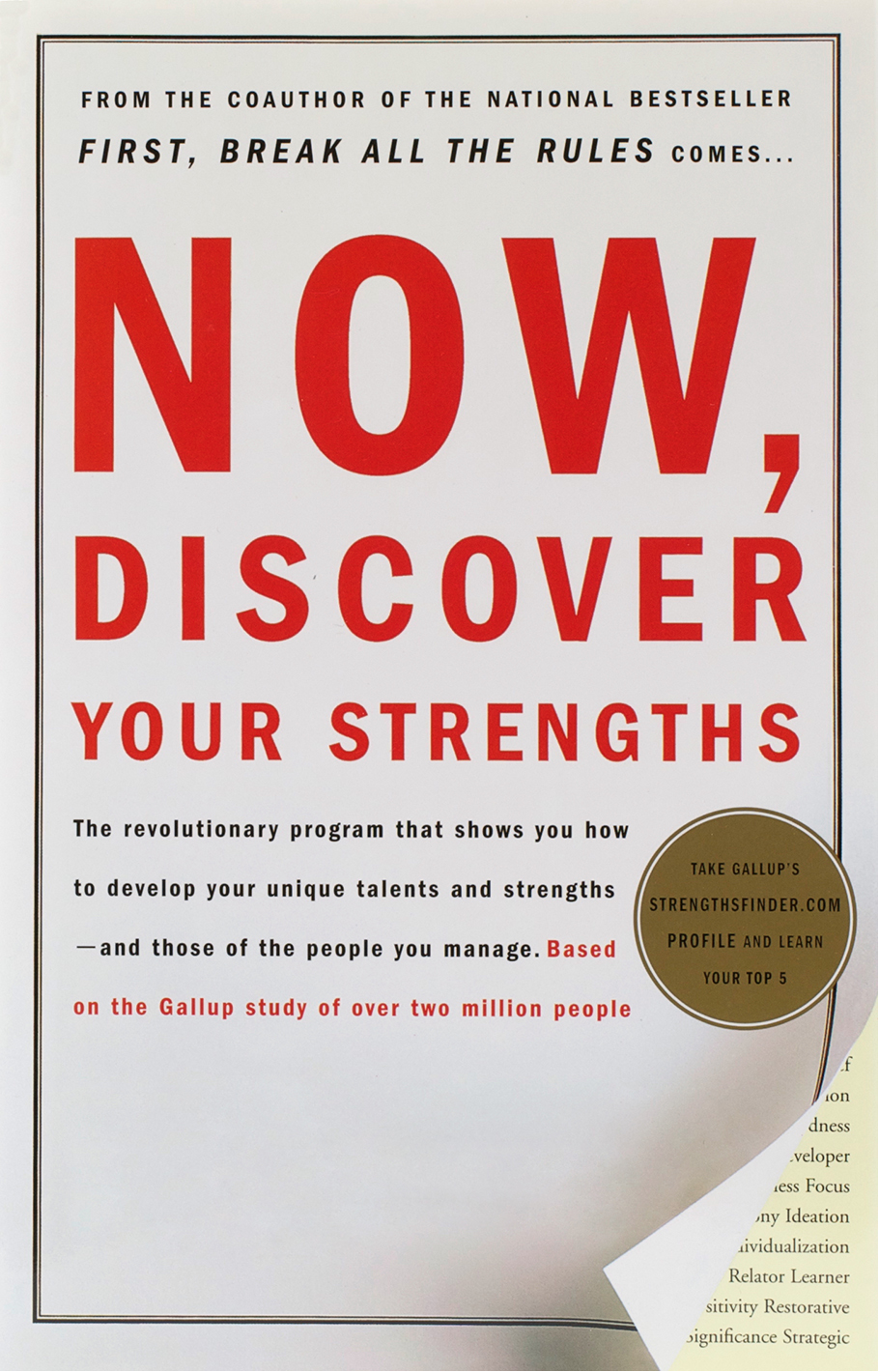
ISBN: 978-1-59562-035-4
Copyright 2001 Gallup, Inc.
All rights reserved, including the right of reproduction in whole or in part in any form.
Gallup, Clifton StrengthsFinder, Gallup Press, Q, and StrengthsFinder are trademarks of Gallup, Inc. All other trademarks are property of their respective owners. The Q items are protected by copyright of Gallup, Inc., 1993-1998. All rights reserved.
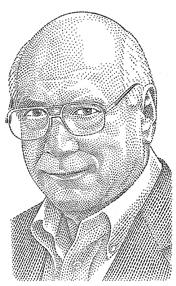
Donald O. Clifton, Ph.D. (1924-2003)
The Father of Strengths-Based Psychology and Creator of the Clifton StrengthsFinder
The Clifton StrengthsFinder is the culmination of more than 50 years of Dr. Donald O. Cliftons lifelong work: leading millions of people around the world to discover their strengths. In 2002, Dr. Clifton was honored by an American Psychological Association Presidential Commendation as the Father of Strengths-Based Psychology.
CONTENTS
IMPORTANT Information About Taking Clifton StrengthsFinder
Your ebook retailer will provide you with your unique, one-use-only access to take the Clifton StrengthsFinder assessment that is included with this book. To take the assessment, go to www.strengthsfinder.com. Navigate to the bottom of the page where you will see the cover image for Now, Discover Your Strengths . Follow the instructions, and when prompted, enter your access code.
Introduction: The Strengths Revolution at Work
Guided by the belief that good is the opposite of bad, mankind has for centuries pursued its fixation with fault and failing. Doctors have studied disease in order to learn about health. Psychologists have investigated sadness in order to learn about joy. Therapists have looked into the causes of divorce in order to learn about happy marriage. And in schools and workplaces around the world, each one of us has been encouraged to identify, analyze, and correct our weaknesses in order to become strong.
This advice is well intended but misguided. Faults and failings deserve study, but they reveal little about strengths. Strengths have their own patterns.
To excel in your chosen field and to find lasting satisfaction in doing so, you will need to understand your unique patterns. You will need to become an expert at finding and describing and applying and practicing and refining your strengths. So as you read this book, shift your focus. Suspend whatever interest you may have in weakness and instead explore the intricate detail of your strengths. Take the StrengthsFinder Profile. Learn its language. Discover the source of your strengths.
If by the end of the book you have developed your expertise in what is right about you and your employees, this book will have served its purpose.
The Revolution
What are the two assumptions on which great organizations must be built?
We wrote this book to start a revolution, the strengths revolution. At the heart of this revolution is a simple decree: The great organization must not only accommodate the fact that each employee is different, it must capitalize on these differences. It must watch for clues to each employees natural talents and then position and develop each employee so that his or her talents are transformed into bona fide strengths. By changing the way it selects, measures, develops, and channels the careers of its people, this revolutionary organization must build its entire enterprise around the strengths of each person.
And as it does, this revolutionary organization will be positioned to dramatically outperform its peers. In our latest meta-analysis The Gallup Organization asked this question of 198,000 employees working in 7,939 business units within 36 companies: At work do you have the opportunity to do what you do best every day? We then compared the responses to the performance of the business units and discovered the following: When employees answered strongly agree to this question, they were 50 percent more likely to work in business units with lower employee turnover, 38 percent more likely to work in more productive business units, and 44 percent more likely to work in business units with higher customer satisfaction scores. And over time those business units that increased the number of employees who strongly agreed saw comparable increases in productivity, customer loyalty, and employee retention. Whichever way you care to slice the data, the organization whose employees feel that their strengths are used every day is more powerful and more robust.
This is very good news for the organization that wants to be on the vanguard of the strengths revolution. Why? Because most organizations remain startlingly inefficient at capitalizing on the strengths of their people. In Gallups total database we have asked the opportunity to do what I do best question of more than 1.7 million employees in 101 companies from 63 countries. What percentage do you think strongly agrees that they have an opportunity to do what they do best every day? What percentage truly feels that their strengths are in play?
Twenty percent. Globally, only 20 percent of employees working in the large organizations we surveyed feel that their strengths are in play every day. Most bizarre of all, the longer an employee stays with an organization and the higher he climbs the traditional career ladder, the less likely he is to strongly agree that he is playing to his strengths.
Alarming though it is to learn that most organizations operate at 20 percent capacity, this discovery actually represents a tremendous opportunity for great organizations. To spur high-margin growth and thereby increase their value, great organizations need only focus inward to find the wealth of unrealized capacity that resides in every single employee. Imagine the increase in productivity and profitability if they doubled this number and so had 40 percent of their employees strongly agreeing that they had a chance to use their strengths every day. Or how about tripling the number? Sixty percent of employees saying strongly agree isnt too aggressive a goal for the greatest organizations.
How can they achieve this? Well, to begin with they need to understand why eight out of ten employees feel somewhat miscast in their role. What can explain this widespread inability to position people in particular senior people who have had the chance to search around for interesting roles to play to their strengths?
The simplest explanation is that most organizations basic assumptions about people are wrong. We know this because for the last thirty years Gallup has been conducting research into the best way to maximize a persons potential. At the heart of this research are our interviews with eighty thousand managers most excellent, some average in hundreds of organizations around the world. Here the focus was to discover what the worlds best managers (whether in Bangalore or Bangor) had in common. We described our discoveries in detail in the book First, Break All the Rules , but the most significant finding was this: Most organizations are built on two flawed assumptions about people:
- Each person can learn to be competent in almost anything.
- Each persons greatest room for growth is in his or her areas of greatest weakness.
Presented so baldly, these two assumptions seem too simplistic to be commonly held, so lets play them out and see where they lead. If you want to test whether or not your organization is based on these assumptions, look for these characteristics:
- Your organization spends more money on training people once they are hired than on selecting them properly in the first place.
Next page
